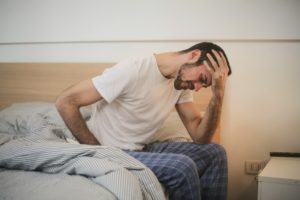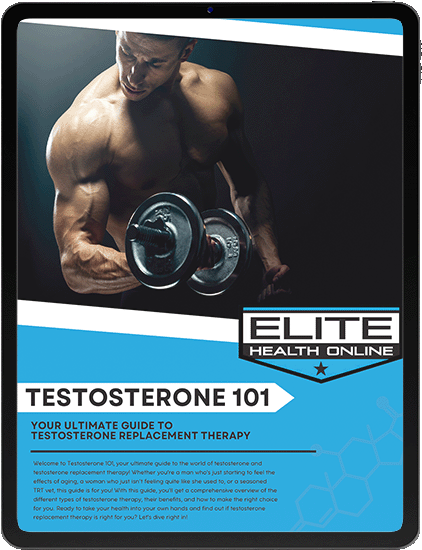Exploring Andropause
Have you been feeling more tired and irritable lately? Has your libido taken a nosedive? If you’re over 40, it could be a sign that your testosterone levels are starting to decline. As men age, testosterone production naturally slows down. This age-related drop, known as andropause, can have some unwelcome effects. The good news is that there are treatment options available if low testosterone is impacting your quality of life.
The Relationship Between Testosterone Levels and Aging
Understanding the correlation between testosterone levels and aging is crucial for men’s health. The decline is a normal part of aging, but it can lead to many adverse symptoms.
Testosterone levels peak during puberty and early adulthood. Starting around age 40, most men experience a gradual decrease of about 1-2% per year. This slow decline continues over the decades, often leading to what’s known as andropause. By the time men reach their 60s and 70s, they frequently have testosterone levels well below the normal range for younger men.
The relationship between aging and testosterone is complex. The bottom line is that lower testosterone is common as you get older, but the impacts don’t have to be accepted as inevitable. Testosterone replacement therapy (TRT) can help restore levels to an optimal range and relieve bothersome symptoms.
Understanding Age-Related Testosterone Decline in Men
Testosterone is a vital hormone that plays a crucial role in various bodily functions, including muscle development, bone density, libido, and overall vitality.
The decline in older men can be attributed to various factors. Firstly, aging itself plays a role as the body’s natural processes gradually decrease production. The Leydig cells in the testes, responsible for testosterone synthesis, may become less efficient over time. Additionally, there can be age-related changes in the hypothalamus and pituitary gland, which regulate the production.
Chronic health conditions, such as obesity, diabetes, and cardiovascular disease, can also contribute to lower levels in older men. Lifestyle choices, including sedentary behavior, poor diet, excessive alcohol consumption, and high levels of stress, can further exacerbate the decline.
The Potential Impacts of Low Testosterone as You Age
The decline of testosterone leads to some unwanted side effects that can impact your quality of life. Some of the potential impacts can include:
- Decreased sex drive and erectile dysfunction. This is the hormone responsible for libido and sexual function in men. As it declines, you may notice a drop in interest in sex or difficulty getting or maintaining an erection.
- Lower muscle mass. It plays an important role in building and maintaining muscle. You may find it more difficult to build muscle or that you’re losing strength during your workouts. This can also lead to weight gain as your metabolism slows down.
- Low energy and fatigue. If your testosterone is low, you’re likely to feel tired and run down. Simple tasks may seem difficult or draining. You may have trouble sleeping well at night, which further contributes to fatigue and low motivation.
- Mood changes. It influences mood and mental well-being. Low levels are linked to irritability, depression, and difficulty concentrating or focusing. You may feel less motivated or driven in your daily life.
- Increased body fat. Especially around the midsection. As testosterone declines and muscle mass decreases, body fat tends to increase. You may notice extra weight and inches around your belly even if your diet and exercise routine remains unchanged.
Signs You May Have Low Testosterone Due to Aging
Aging causes a natural decline in testosterone and it can manifest in various symptoms such as low sex drive, fatigue, mood changes, and difficulty in building muscle mass. If you identify with several of these signs, it is advisable to consult your doctor.
A simple blood test can determine whether your testosterone levels have decreased due to aging. If confirmed, TRT may be a suitable option to alleviate symptoms and restore your sense of well-being.
How can TRT Help?
Testosterone replacement therapy (TRT) can help relieve many of the symptoms associated with low testosterone levels as you age. By supplementing your body’s declining testosterone levels, TRT can:
- Improve your libido and sex drive. Restoring testosterone to optimal levels can bring back your interest in sex and improve your performance and stamina, as it is the primary hormone responsible for your libido and sex drive.
- Increase your energy levels. TRT can boost your energy, vitality, and motivation to be active and exercise.
- Build muscle mass. TRT promotes muscle growth and can help reverse the loss of muscle mass that comes with aging.
- Enhance your mood. Low testosterone is associated with irritability, depression, and mood changes. TRT may reduce feelings of sadness and help stabilize your mood.
- Strengthen your bones. TRT can help prevent or slow age-related bone loss and may even increase bone density and strength.
- Improve cognition. Research shows that TRT may enhance certain cognitive functions, like sharpening your memory.
The benefits of TRT are significant, but it does come with some risks and side effects. You should discuss the pros and cons with your doctor to determine if TRT is right for you based on your hormone levels, symptoms, medical history, and personal preferences. TRT may not be for everyone, but for many men, it can help combat the unwanted effects of aging and allow them to feel like themselves again.
Conclusion
So there you have it, the key facts about how your testosterone levels naturally start to decline as you age and the potential effects that can have on your health and well-being. The good news is, the symptoms of low testosterone are often manageable. Talk to your doctor if you experience symptoms like low energy, mood changes, decreased muscle mass, or reduced libido. They may test your hormone levels and discuss treatment options like testosterone replacement therapy to help get your levels back to normal range. While aging is inevitable, keeping your testosterone in check and maintaining an active lifestyle can help you continue to feel like your energetic and vibrant self for years to come. Take charge of your health and contact us today- you’ve got this!


